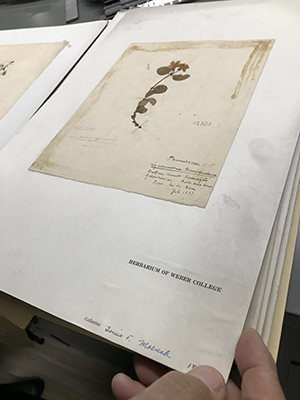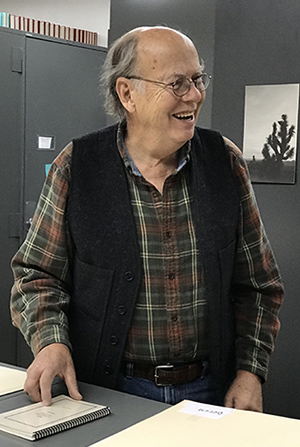Plant Collection of First WSU Principal Gets New Home in University Archives
OGDEN, Utah – One hundred and thirty years ago, Louis F. Moench was hired as principal of Weber Stake Academy, now Weber State University. He was a teacher, a leader and a collector. The plants he carefully cataloged, dating back to the 1880s, will soon find a permanent home in University Archives housed in the Stewart Library.
 Currently, Moench’s collection, along with a 120-page collection from John Lind, the first faculty member to hold a Ph.D. at Weber State, resides in the Mary Carver Hall Herbarium located in the Tracy Hall Science Center Room 345.
Currently, Moench’s collection, along with a 120-page collection from John Lind, the first faculty member to hold a Ph.D. at Weber State, resides in the Mary Carver Hall Herbarium located in the Tracy Hall Science Center Room 345.
Herbarium curator and botany professor Stephen Clark has carefully cared for the pages during his long tenure, but after 54 years of teaching, Clark is retiring next spring and turning the Moench and Lind collections over to University Archives for permanent preservation.
“These pages show a tradition, a history,” Clark said. “They tell me something about the people. I have a real fondness for these guys who were naturalists, and I want to make sure their work remains intact and available to researchers.”
Both collections are beautiful: the plants brittle but intact, the handwritten information clearly legible, the paper a little yellowed, but unwrinkled and unmarred. Very little of Moench’s original work has been preserved, making his plant collection even more valuable to modern historians.
“Viewing the Louis F. Moench herbarium collection for the first time was an awe-inspiring experience,” said Jamie Weeks, university archivist. “As an archivist and historian, it actually gave me that giddy feeling of butterflies in my stomach, which hardly ever happens. When the opportunity to house and preserve this collection presented itself, University Archives immediately ordered a controlled environment archival herbarium storage cabinet with lock and key to house these historical records. High-resolution photographs will be taken to preserve a digital copy, but we expect the original documents to continue to stand the test of time and outlast all of us.”
 Moench’s plants came from Bern, Switzerland. They were collected over a five-year period and include samples of columbine, monkshood and mallow.
Moench’s plants came from Bern, Switzerland. They were collected over a five-year period and include samples of columbine, monkshood and mallow.
“I think they’re just priceless. I mean, they’re just absolutely priceless — 1883,” Clark exclaimed. “I look at these and think, ‘Gosh, this is so cool.’
Lind’s degree was in geology, but from the time he was hired in 1910, through much of his 28-year career, he was a one-man department of science, teaching courses in geology, mineralogy, chemistry, physics, zoology, physiology, physical geography and Latin. Lind gathered plants from his worldwide travels.
“Lind knew plants. He knew animals. He knew rocks. He knew the stars,” Clark said. “He knew everything. He was an in-the-dirt, hands-on kind of scientist.”
Clark followed in the footsteps of those collectors. As a plant taxonomist and ethnobotanist, Clark has traveled five continents studying plants, particularly how they are used by Native Americans, witch doctors, shamans and healers.
He’s examined plants from many countries, but those Clark has cataloged come from Northern Utah, particularly close to the university. He’s built Weber State’s herbarium into a collection of approximately 28,000 specimens.
“It’s a really good little collection,” Clark said. “With our resources, we decided to make a really nice reference collection for the plants in the immediate area, and that’s what we’ve done here.”
Clark wrote “A Flora of the Central Wasatch,” a field guide, which he makes available to students of plant taxonomy who want to identify plants in the area. That research helps build the collection the first principal of the Weber Stake Academy began more than 130 years ago.
For photos, visit the following link.
wsuucomm.smugmug.com/Marketing-Communications/Magazines/2018-Spring-Magazine
Visit weber.edu/wsutoday for more news about Weber State University.
Allison Barlow Hess, public relations director
801-626-7948 • ahess@weber.edu- Contact:
Stephen Clark, botany professor
801-626-6182 • sclark@weber.edu